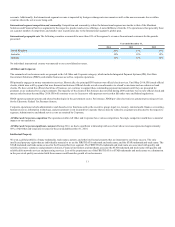First Data 2014 Annual Report Download - page 21
Download and view the complete annual report
Please find page 21 of the 2014 First Data annual report below. You can navigate through the pages in the report by either clicking on the pages listed below, or by using the keyword search tool below to find specific information within the annual report.
federal, state, and local laws and regulations. The U.S. Congress and governmental agencies have increased their scrutiny of a number of credit card practices,
from which some of our customers derive significant revenue. Regulation of the payments industry, including regulations applicable to us and our customers,
has increased significantly in recent years. Failure to comply with laws and regulations applicable to our business may result in the suspension or revocation
of licenses or registrations, the limitation, suspension or termination of services, and/or the imposition of consent orders or civil and criminal penalties,
including fines which could have an adverse effect on our results of operation and financial condition. We are subject to U.S. and international financial
services regulations, a myriad of consumer protection laws, economic sanctions, laws and regulations, and anti-corruption laws, escheat regulations and
privacy and information security regulations to name only a few. Changes to legal rules and regulations, or interpretation or enforcement of them, could have
a negative financial effect on us. In particular, the Dodd-Frank Wall Street Reform and Consumer Protection Act of 2010, which was signed into law in
July 2010, significantly changed the U.S. financial regulatory system, including creating a new independent agency funded by the Federal Reserve Board,
the Consumer Financial Protection Bureau, to regulate consumer financial products and services (including many offered by our customers), restricting debit
card fees paid by merchants to issuer banks and allowing merchants to offer discounts for different payment methods.
In order to provide our transaction processing services, several of our subsidiaries are registered with Visa and MasterCard and other networks as members or
service providers for member institutions. As such, we and many of our customers are subject to card association and network rules that could subject us or
our customers to a variety of fines or penalties that may be levied by the card associations or networks for certain acts or omissions by us, acquirer customers,
processing customers, and merchants. Visa, MasterCard, and other networks, some of which are our competitors, set the standards with respect to which we
must comply. The termination of our member registration or our status as a certified service provider, or any changes in card association or other network
rules or standards, including interpretation and implementation of the rules or standards, that increase the cost of doing business or limit our ability to
provide transaction processing services to or through our customers, could have an adverse effect on our business, results of operations, and financial
condition.
Our trademarks, patents, and other intellectual property are important to our future success. The FIRST DATA trademark and trade name and the STAR
trademark and trade name are intellectual property rights which are individually material to us. These trademarks and trade names are widely recognized and
associated with quality and reliable service. Loss of the proprietary use of the FIRST DATA or STAR trademarks and trade names or a diminution in the
perceived quality associated with them could harm the growth of our businesses. We also rely on proprietary technology. It is possible that others will
independently develop the same or similar technology. Assurance of protecting our trade secrets, know-how or other proprietary information cannot be
guaranteed. Our patents could be challenged, invalidated or circumvented by others, and may not be of sufficient scope or strength to provide us with any
meaningful protection or advantage. If we are unable to maintain the proprietary nature of our technologies, we could lose competitive advantages and be
materially adversely affected. The laws of certain foreign countries in which we do business or contemplate doing business in the future do not recognize
intellectual property rights or protect them to the same extent as do the laws of the United States. Adverse determinations in judicial or administrative
proceedings could prevent us from selling our services or prevent us from preventing others from selling competing services, and thereby may have a material
adverse effect on the business and results of operations. Additionally, claims have been made, are currently pending, and other claims may be made in the
future, with regard to our technology allegedly infringing on a patent or other intellectual property rights. Unfavorable resolution of these claims could either
result in us being restricted from delivering the related product or service or result in a settlement that could be materially adverse to us.
Through our merchant alliances, we hold an ownership interest in several competing merchant acquiring businesses while serving as an electronic processor
for those businesses. In order to satisfy state and federal antitrust requirements, we actively maintain an antitrust compliance program. Notwithstanding our
compliance program, it is possible that perceived or actual violation of state or federal antitrust requirements could give rise to regulatory enforcement
investigations or actions. Regulatory scrutiny of, or regulatory enforcement action in connection with, compliance with state and federal antitrust
requirements could have a material adverse effect on our reputation and business.
21
























